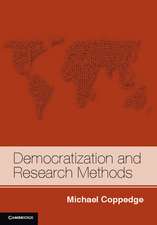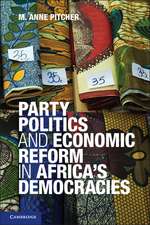Challenging Neoliberalism in Latin America: Cambridge Studies in Contentious Politics
Autor Eduardo Silvaen Limba Engleză Paperback – 30 aug 2009
Din seria Cambridge Studies in Contentious Politics
-
 Preț: 251.27 lei
Preț: 251.27 lei -
 Preț: 220.86 lei
Preț: 220.86 lei -
 Preț: 203.50 lei
Preț: 203.50 lei -
 Preț: 238.15 lei
Preț: 238.15 lei - 9%
 Preț: 626.76 lei
Preț: 626.76 lei -
 Preț: 162.90 lei
Preț: 162.90 lei -
 Preț: 210.37 lei
Preț: 210.37 lei -
 Preț: 160.00 lei
Preț: 160.00 lei -
 Preț: 178.72 lei
Preț: 178.72 lei -
 Preț: 289.11 lei
Preț: 289.11 lei -
 Preț: 197.42 lei
Preț: 197.42 lei -
 Preț: 231.38 lei
Preț: 231.38 lei -
 Preț: 274.27 lei
Preț: 274.27 lei -
 Preț: 227.61 lei
Preț: 227.61 lei - 11%
 Preț: 637.54 lei
Preț: 637.54 lei -
 Preț: 474.87 lei
Preț: 474.87 lei -
 Preț: 225.50 lei
Preț: 225.50 lei -
 Preț: 269.58 lei
Preț: 269.58 lei -
 Preț: 201.59 lei
Preț: 201.59 lei -
 Preț: 229.56 lei
Preț: 229.56 lei -
 Preț: 238.13 lei
Preț: 238.13 lei -
 Preț: 306.73 lei
Preț: 306.73 lei - 11%
 Preț: 553.62 lei
Preț: 553.62 lei - 11%
 Preț: 694.04 lei
Preț: 694.04 lei -
 Preț: 231.05 lei
Preț: 231.05 lei -
 Preț: 305.33 lei
Preț: 305.33 lei -
 Preț: 201.59 lei
Preț: 201.59 lei -
 Preț: 230.51 lei
Preț: 230.51 lei - 14%
 Preț: 791.97 lei
Preț: 791.97 lei - 11%
 Preț: 555.03 lei
Preț: 555.03 lei -
 Preț: 251.27 lei
Preț: 251.27 lei -
 Preț: 251.27 lei
Preț: 251.27 lei - 11%
 Preț: 459.73 lei
Preț: 459.73 lei -
 Preț: 267.08 lei
Preț: 267.08 lei
Preț: 263.79 lei
Nou
Puncte Express: 396
Preț estimativ în valută:
50.48€ • 53.98$ • 42.09£
50.48€ • 53.98$ • 42.09£
Carte tipărită la comandă
Livrare economică 17 aprilie-01 mai
Preluare comenzi: 021 569.72.76
Specificații
ISBN-13: 9780521705721
ISBN-10: 052170572X
Pagini: 336
Ilustrații: 21 tables
Dimensiuni: 157 x 235 x 18 mm
Greutate: 0.45 kg
Editura: Cambridge University Press
Colecția Cambridge University Press
Seria Cambridge Studies in Contentious Politics
Locul publicării:New York, United States
ISBN-10: 052170572X
Pagini: 336
Ilustrații: 21 tables
Dimensiuni: 157 x 235 x 18 mm
Greutate: 0.45 kg
Editura: Cambridge University Press
Colecția Cambridge University Press
Seria Cambridge Studies in Contentious Politics
Locul publicării:New York, United States
Cuprins
1. The inconvenient fact of antineoliberal mobilization; 2. Contentious politics, contemporary market society, and power; 3. The argument: explaining episodes of antineoliberal contention in Latin America; 4. Argentina; 5. Bolivia; 6. Ecuador; 7. Venezuela; 8. Peru and Chile; Conclusion.
Recenzii
'Waves of social protest against market liberalization have radically transformed Latin America's political landscape since the 1990s, but there has been considerable variation in the levels and patterns of popular mobilization across cases. Eduardo Silva explains why in this pathbreaking analysis of how diverse social actors mobilize and coordinate resistance to market society. Silva's account makes a major contribution to the study of social movements in Latin America, and it sheds new light on the role of social actors in the demise of the 'Washington consensus' for neoliberal reform and the political shift to the Left that followed in its wake.' Kenneth M. Roberts, Robert S. Harrison Director, Institute for the Social Sciences, Cornell University
'Challenging Neoliberalism in Latin America is an essential book for analysts of social movements and Latin American politics, as well as anyone who cares about economic inequality, social justice, and citizenship in a globalized world. In it, Eduardo Silva makes a bold argument about the causes and significance of recent protests in Argentina, Bolivia, Ecuador, and Venezuela. Seeing these protests as part of a wave of anti-neoliberal collective action, Silva shows how the social movements behind them have transformed state-society relations in the region. Silva keeps big questions about popular contention and state formation firmly in view throughout the book. He combines research with insightful commentary on relevant theory in a text that is both original and accessible.' Anthony W. Pereira, Tulane University
'Challenging Neoliberalism in Latin America is an essential book for analysts of social movements and Latin American politics, as well as anyone who cares about economic inequality, social justice, and citizenship in a globalized world. In it, Eduardo Silva makes a bold argument about the causes and significance of recent protests in Argentina, Bolivia, Ecuador, and Venezuela. Seeing these protests as part of a wave of anti-neoliberal collective action, Silva shows how the social movements behind them have transformed state-society relations in the region. Silva keeps big questions about popular contention and state formation firmly in view throughout the book. He combines research with insightful commentary on relevant theory in a text that is both original and accessible.' Anthony W. Pereira, Tulane University
Notă biografică
Descriere
Eduardo Silva offers the first comprehensive comparative study of anti-free market movements in Latin America and a resulting shift in governmental intervention in the economy and society.












